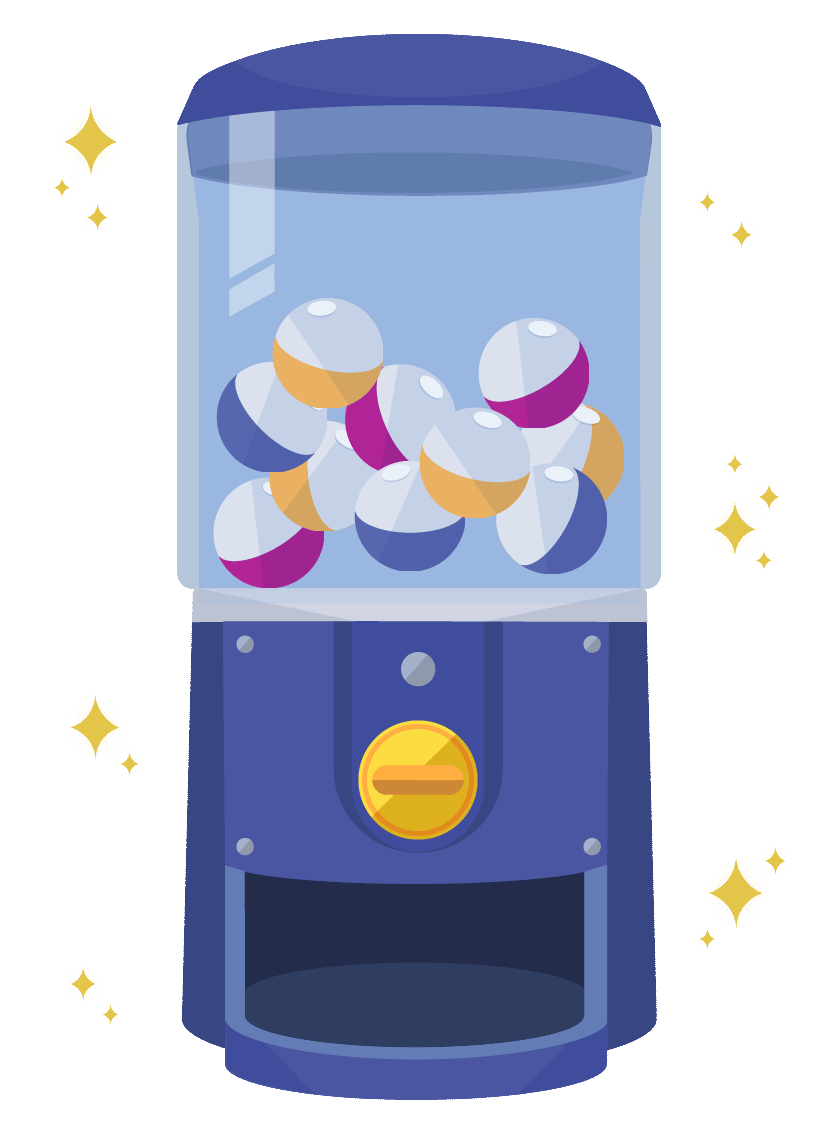おはこんばんちわ〜 everyone! 
This week’s topic is going to be 〇〇ガチャ. You can probably tell but this follows the same format as 〇〇構文 where the 〇〇 is just a placeholder!
As with 〇〇構文 anything can replace 〇〇.
ガチャ? 
If you are learning Japanese or play video games, you probably know what this one means.
For those of you who do not know, ガチャ is a trademarked name for capsule toys. To understand this phrase, you will need to know the mechanism of ガチャガチャ・ガシャポン・ガチャガチャ. If you already know how they work feel free to skip to the first fun-fact!
ガチャガチャ is a machine that if filled with capsules that contain toys or some sort of merchandise. A person will insert money into the machine and when they turn the handle, a random prize will come out.
こういうの
This concept has been adopted by many video games recently. When you hear someone say that a game is a gacha-game, it means that the player needs to buy things like ‘loot boxes’ until you get the thing that you want. So, basically ガチャ is the oldest form of micro-transaction.
Fun fact: The world ガチャ is trademarked by Takara Tommy, and ガシャポン is trademarked by Bandai. This means that the general term for these toys are actually ‘capsule toys’. This is similar to how the general term is tissue paper, but many people call them Kleenex.
As with anything that involves luck, there is always the sentiment of winning and losing. This means that the format 〇〇ガチャ is used for anything that involves ‘winning or losing’ due to luck.
What are some ‘win/lose’ situation in the real world caused by luck? 
Let’s take a look at some of the popular examples.
親ガチャ 
お前はいいよな、金持ちの家に生まれて。俺の親金もないし、育ちも悪いし、親ガチャ大はずれだ。
You are so lucky to be born in a rich family. My parents have no money and they weren’t raised right. I lost the parent lottery.
Example with furigana
お前(まえ)はいいよな、かのもちの家(いえ)に生(う)まれて。俺(おれ)の親(おや)金(かね)もないし、育(そだ)ちも悪(わる)いし、親(おや)ガチャ大(おお)はずれだ。
You are so lucky to be born in a rich family. My parents have no money and they weren’t raised right. I lost the parent lottery.
What is considered as a ハズレ for this one?
The parents are criminals, poor, helicopter parents, or they are just toxic people in general. These parents are often called 毒親 in Japanese and the meaning should be pretty self explanatory. If a parent fits any criteria to be a 毒親, you can say got a ハズレ.
What is considered as an 当たり?
Basically the opposite of the above. However, anything ‘expected’ of parents (providing food, providing a place to live, etc.) aren’t always considered as 当たり. People usually consider it as an 当たり if the parents are rich, famous, or let’s you do whatever you want.
Since children are also like a ‘lottery’, 子供ガチャ also exists. However, this is not used as often since the parents are usually blamed for raising their child incorrectly.
隣人ガチャ 
隣の人は配信者かなんか分かんないけど、夜中になっても叫び声が聞こえる。まじで隣人ガチャ外れたわ。
I don’t know if my neighbor is a streamer or what, but I can hear them screaming even at midnight. I seriously lost the neighbor lottery.
Example with furigana
隣(となり)の人(ひと)は配信者(はいしんしゃ)かなんか分(わ)かんないけど、夜中(よなか)になっても叫(さけ)び声(こえ)が聞(き)こえる。まじで隣人(りんじん)ガチャ外(はず)れたわ。
I don’t know if my neighbor is a streamer or what, but I can hear them screaming even at midnight. I seriously lost the neighbor lottery.
What is considered as a ハズレ for this one?
Loud neighbors, people that do not follow community rules, and people that make unreasonable complaints.
What is considered as an 当たり?
Quiet, follows rules….Alive? Not too difficult to be a good neighbor.
This one is hard to do prior research since you can’t really know what your neighbor is like until you actually live there.
上司ガチャ 
上司ガチャでSR引いたかも。
I think I got the best boss. (I got a super rare boss)
Example with furigana
上司(じょうし)ガチャでSR引(ひ)いたかも。
I think I got the best boss. (I got a super rare boss)
What is considered as a ハズレ for this one?
Does not listen to anyone other than their bosses, they are stuck in the past, blames people under them for any mistakes, or just a terrible human in general.
What is considered as an 当たり?
In most cases, if the boss is a good person and lets you go home in time, they are considered as an 当たり. With what the work culture is like in Japan the bar is set quite low for this one.
These are just some of the popular ones that get used most often (in my opinion), but there are a bunch more. Anything that you don’t have any control over can be a ガチャ, like the country you were born in, the era you were born in, your genetics, etc., etc. So, if you ever see the format WORD + ガチャ you can assume that they are either complaining or being grateful about the current situation that they are in.
Fun-fact:
There are websites that show bad neighbors! If you are ever looking for a place in Japan, it would be smart to check this map to see if there are any bad neighbors in the building/neighborhood you are thinking of living in. Just a warning, some of these posts are made by the ‘Karen’-type of people, so some of the complaints are not a deal breaker…but it will tell you that there are 面倒臭い kinds of people in that area.
Fun-fact fun-fact:
Similar to the bad neighbor look up website, there is a website where you can search for houses that come with an invisible, non-rent paying roommate!
This website exists to give information about the where and how the residents passed. This website exists since many people in Japan do not want to live in a 事故物件, stigmatized property, and realtors are legally not required to give you these information to people other than the first tenant. The building you live in might be a lot spookier than you imagined! Check at your own risk!
俺は最近配達員ガチャに外れた。置き配設定にしといたのに、家にいない間にピンポン鳴らされて不在票を入れられてた。
 Fuga
Fuga 
If you missed the previous posts, you can check them out here!


